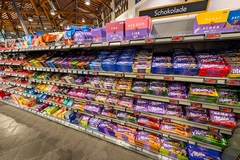
- Industry news
Industry news
- Category news
Category news
- Reports
- Key trends
- Multimedia
- Journal
- Events
- Suppliers
- Home
- Industry news
Industry news
- Category news
Category news
- Reports
- Key trends
- Multimedia
- Events
- Suppliers
PepsiCo Delivers Solid Financial Results for Second Quarter 2011

Net revenue increased 14 percent reflecting the benefits of organic volume growth, effective net pricing, and favorable foreign exchange. Net revenue grew 8 percent on an organic basis.

Jul 22 2011 --- PepsiCo, Inc. reported growth in volume, revenue, operating profit and earnings per share for the second quarter of 2011 driven by top-line gains across its worldwide snacks and beverage businesses, and from the acquisition of Wimm-Bill-Dann (WBD), the leading dairy and juice company in Russia.
"Our global portfolio in both snacks and beverages is growing volume and net revenue, our global snacks portfolio, in particular, posted another strong quarter with balanced top- and bottom-line growth, and we continue to enjoy robust top-line growth in key emerging markets," said PepsiCo Chairman and CEO Indra Nooyi. "While we are satisfied with the performance of our portfolio overall, the consumer in developed markets continues to be stressed, and the competitive environment in North America beverages has been particularly challenging. We are therefore implementing previously announced incremental pricing actions in the third quarter to more fully cover input costs while continuing to support our brand-building initiatives. We remain confident in our ability to continue to profitably grow our overall business, even in this uncertain economic environment."
Worldwide servings growth was 6 percent in the quarter and 7 percent year to date, with strength across the Company's diverse snacks and beverage portfolio. Worldwide snacks volume increased 10 percent reflecting broad-based gains in the snacks portfolio and the impact of the WBD acquisition. Excluding the WBD impact, snacks volume gained 4 percent. Worldwide beverage volume increased 5 percent, including a 3-percentage-point impact from the WBD acquisition and despite challenging conditions in the North American beverage market. Volume performance was led by growth in emerging markets, where organic volume increased 9 percent in snacks and 4 percent in beverages.
Net revenue increased 14 percent reflecting the benefits of organic volume growth, effective net pricing, and favorable foreign exchange. Net revenue grew 8 percent on an organic basis.
Reported total operating profit increased 12 percent, reported net income increased 18 percent and reported EPS increased 20 percent.
Core operating profit increased 5 percent, reflecting the benefits of net revenue gains, synergies from the anchor bottler acquisitions, productivity, favorable foreign exchange and the impact of the acquisition of WBD, offset somewhat by higher commodity and operating costs. Core EPS of $1.21 increased 10 percent driven by operating profit growth and a lower year-over-year core income tax rate.
Frito-Lay North America (FLNA)
FLNA increased volume 2 percent in the quarter reflecting especially strong performance in the convenience, dollar and drug channels, and each of the division's five largest trademarks – Lay's, Tostitos, Doritos, Cheetos and Ruffles – posted revenue growth driven by strong innovation. Both gross margins and operating margins expanded in the quarter reflecting the benefits of net revenue growth and productivity.
Latin America Foods (LAF)
Volume growth in the quarter reflected gains in the division's largest markets, Mexico and Brazil, and double-digit growth in a number of other Central and South American markets. Growth was driven by a broad innovation agenda and strong promotions and marketplace execution. Operating profit growth benefited from a legal settlement included in the prior year.
Quaker Foods North America (QFNA)
Volume performance trends improved sequentially from the first quarter of 2011, driven by growth in hot cereal. Net pricing and productivity led to strong gross margin and operating margin expansion.
PepsiCo Americas Beverages (PAB)
PAB volume declined 1 percent in the quarter and was up slightly year to date on an organic basis, driven by growth in non-carbonated beverages, offset by declines in CSDs. Non-carbonated beverage growth in the quarter and year to date was led by growth in Gatorade. CSD performance in the second quarter was hampered by difficult retail pricing comparisons with the prior year quarter.
Operating profit performance reflected inflation in commodity and other operating costs and increased brand support, offset partially by synergy benefits related to the bottling acquisitions, the settlement of promotional spending accruals and certain insurance adjustments. Effective net pricing in the quarter was not sufficient to fully offset the magnitude of cost inflation.
Europe
Organic volume increased 5 percent in both snacks and beverages, and net revenue increased 18 percent excluding the impact of the WBD acquisition. Organic snacks volume growth was led by double-digit growth in Turkey and South Africa (which is included in the Europe reporting segment). Organic beverage volume growth was balanced between Eastern and Western Europe driven by Poland, Turkey, Germany and France.
Operating profit performance benefited from organic volume growth, the impact of the WBD acquisition, effective net pricing, timing of concentrate shipments, and settlement of promotional spending accruals, offset by high levels of input cost inflation, including potato costs in Russia and spending on go-to-market initiatives in Eastern Europe.
Asia, Middle East & Africa (AMEA)
Snacks volume increased 15 percent and beverage volume grew 6 percent, led by strong performance in key emerging markets. Snacks grew double digits in the Middle East, India, China and Thailand. Beverage growth was driven by double-digit gains in India and China, offset by volume softness in some Middle East markets as political unrest led to lower on-premise beverage demand.
Operating profit reflected the volume gains, effective net pricing, timing of concentrate shipments and the recovery of a previously written-off receivable, offset by higher commodity costs.









